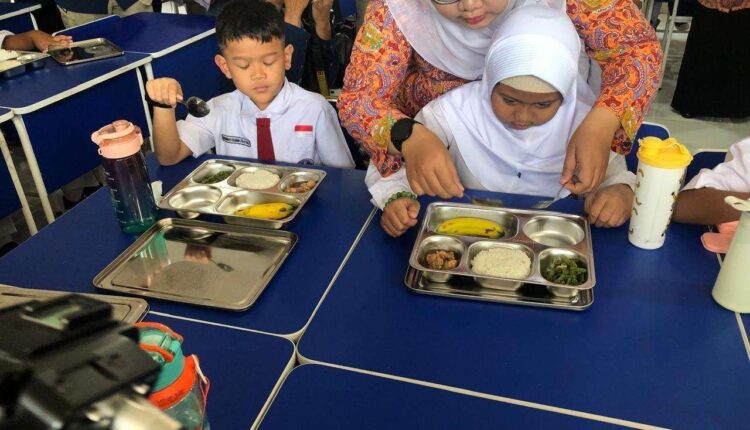The Wheel of the People’s Economy Turns Impacted by the Free Nutritious Meal Program
By: Salahudin Wahab *)
The Free Nutritious Meal Program (MBG) which began on January 6, 2025 has had a significant impact, both in the social and economic fields. This program not only aims to provide nutritious food for school children, but also to stimulate economic turnover in the regions, especially in rural areas. This was conveyed by the Chairman of the National Economic Council (DEN), Luhut Binsar Pandjaitan, who gave a positive response regarding the implementation of this program.
Luhut explained that the MBG program provides extraordinary benefits, especially for school children who often have difficulty accessing nutritious food. Previously, children only relied on pocket money to buy food that sometimes had unclear nutritional content. With this program, children have the opportunity to obtain food that is not only filling, but also nutritious. This program provides better access to nutritional intake that may have previously been difficult to obtain outside of school, as well as reducing dependence on unhealthy food.
In addition to the direct impact on children, Luhut also emphasized that this program has a positive effect on the regional economy. At the village level, this program has stimulated significant money circulation. Along with the increasing demand for food ingredients such as vegetables, meat, eggs, and fruits, local farmers and MSMEs have also felt the benefits. This program provides new opportunities for them to increase production and sales of quality food ingredients. This shows that the MBG program is not only focused on providing food, but also on empowering the local community economy.
Member of the National Economic Council, Arief Anshory Yusuf, added that this program also helps ease the burden of household consumption. With a fund allocation of IDR 10,000 per child per day, a family with two children can earn around IDR 400,000 per month, which is quite a large amount and almost equivalent to the poverty line in Indonesia. This assistance is very meaningful for families who have difficulty meeting basic needs, especially in terms of balanced nutrition. This program, according to Arief, not only provides benefits in the short term, but also has the potential to increase people’s purchasing power in the medium term. Thus, this program is expected to help reduce poverty levels in various regions, especially in rural areas.
In addition to the immediate social and economic impacts, the Coordinating Minister for Political, Legal, and Security Affairs, Budi Gunawan, also expressed his appreciation for the MBG program. He stated that this program is able to drive the people’s economy by involving various parties in the food supply chain. Starting from farmers who produce vegetables and fruits, to MSMEs who play a role in distributing food. This program encourages the creation of a mutually supportive ecosystem between the agricultural, trade, and food service sectors. That way, local communities are not only beneficiaries, but also an important part of the process of providing nutritious food.
Budi Gunawan also highlighted how this program can strengthen the culture of mutual cooperation in the community. In its implementation, the MBG program involves food providers, students who eat it, and the community who help ensure the smooth distribution and quality of the food provided. All parties work together to ensure that this program runs smoothly and provides maximum benefits for all parties involved.
In a broader context, Budi Gunawan hopes that the MBG program can run with good quality and provide wider benefits. He emphasized that this program is part of the government’s efforts to create a golden generation of Indonesia in the future. By ensuring that children get good nutrition from an early age, the government hopes to form a healthier, smarter, and more productive next generation of the nation. This is an important step to support the nation’s progress in the future.
The MBG program is also a concrete manifestation of the government’s efforts to improve social welfare and reduce poverty. This program is designed to provide direct assistance to the community, especially families with children who need better nutritional intake. In addition, this program is expected to contribute to economic equality, not only in big cities, but also in rural areas that are often left behind in terms of access to resources and facilities.
The implementation of this program also opens up opportunities for the community to better understand the importance of consuming nutritious food. With the education related to nutrition provided through this program, the community can be more concerned about healthy and nutritious eating patterns. This can have a positive impact on a broader healthy lifestyle, both for children and adults.
The Free Nutritious Meal Program (MBG) can be considered a strategic step in driving the wheels of the people’s economy and improving social welfare in Indonesia. This program not only provides benefits for children who need good nutrition, but also has a positive impact on farmers, MSMEs, and village communities. Through the involvement of various parties in the food supply chain, this program creates a more inclusive and sustainable economic ecosystem. With strong support from all parties, the MBG program has great potential to become an important part of the government’s efforts to create a more prosperous, healthy, and productive Indonesia.
*) Volunteer from the National Children’s Action Institute
